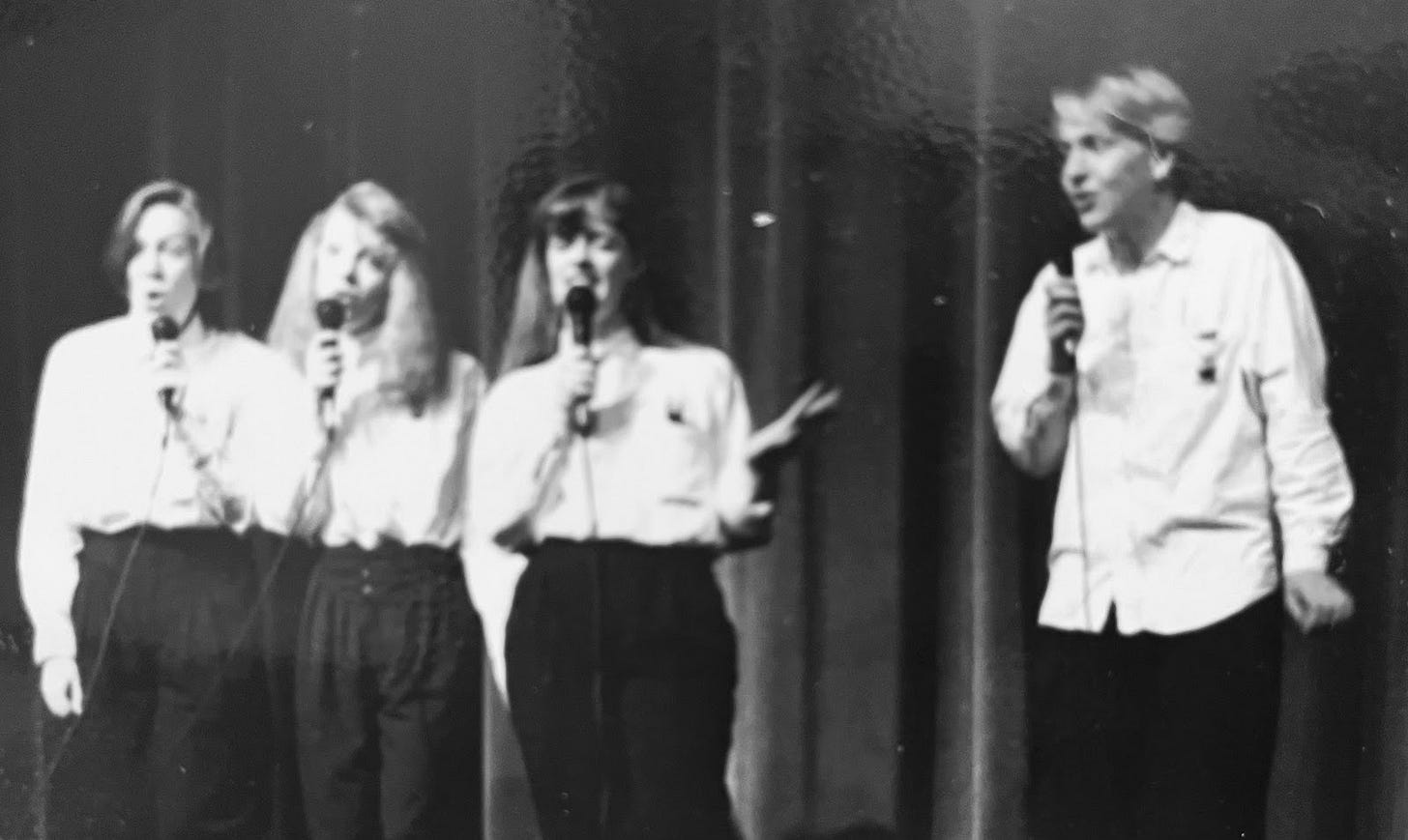This is the tied vocab word you all voted on a few weeks ago—it got exactly the same number of votes that Octothorpe did, so I guess you’ve chosen for me this week as well. Thanks! This… this word sparked a whole fresh unhinged personal essay, only a few details of which appear in my memoir (more on that in some different updates; stay tuned Saturday!), so enjoy? I guess? And thanks again to Don Huely and his Daily Word Insta—this is fun stuff and good fodder for what I’m doing here on Fridays. Gotta love it when artists can cross-pollinate like this, no?
Voices Carry
My Mom was a dancer and an educator when I was growing up, so I was naturally immersed in dance education as a kid and stayed with the movement arts into adulthood, through all my artistic degrees in various artsy things. But what may not be so obvious to an idle biography-peruser of mine is that embedded within my youthful artistic endeavors was my devotion to singing, both as part of my theatrical skills-building but also for its own sake. I was in high-level children’s choirs as a kid: the real good ones, where we’d learn Carmina Burana and be promised an Italian tour before running out of money to do anything ever again. And there were school choirs and Spring blockbuster musicals as a teenager. The choirs in Boulder schools were top-notch, the high school upper crust ones taking over at All-State choir and the UNC Jazz Festival every year. I learned how to read music in the classical choruses, and the jazz ensemble taught me how to have a good ear and a quick memory. I became a damn good singer from that experience. But it was also the beginnings of my crippling self-doubt and denigrated self-esteem.
There were several choirs at Boulder High, the top of which (as I’ve mentioned before) were award-winning and attended big music events like the aforementioned fests, and the bigtime Winter Park Jazz Festival too, which I never was able to afford to go to, after having spent more money than my parents had on expensive dresses and tailor work on same to make them uniform. But I digress. Sort of.
There were some beginner choirs, made for kids who just got into high school or who didn’t know how to sing yet, and they covered the basics, with simple music selections. Then there was a sort of mid-level, kinda mediocre women’s choir called Quintessence, where you’d move up to if you were not that great a singer but were now a junior and the choir director didn’t want to keep you behind with the kids. Then there were two top-tier choirs reserved for the very talented, and/or graduating seniors. Nobody was a slouch in those choirs. One was Chamber Choir that did mostly classical work, and the other was even more selective and smaller, called High Altitude. These few, these special few of High Altitude, were the ones who paired with the jazz band for some songs, but mostly mastered complicated and intricate acapella vocal jazz numbers the likes of which would make Manhattan Transfer blush. (Actually, many of that choir’s tunes were directly from Manhattan Transfer, but again, I digress.)
I was a choir and musical star in junior high, so when I got to high school I expected to take the accelerated route the way all the real talented theatre nerds did: doing well in my first year, and then being propelled from there right to the top tier. After all, if you were a female singer and got put in Quintessence as a junior, you were being given a not-so-subtle message: You’re no good. Here, put on this frog-green satin dress with a dropped waist and be happy with your show tunes. And blend your voice in more with the rest, yipes. Keep it down.
So I went through the beginning of my high school singing experience with flying colors, and my friends of course went right to Chambers & High Altitude the following year, because of course. Me? I was told to change choirs, too. To Quintessence. The mediocre women’s choir.

Already the odd one out in my friend group, there I was, donning that frog-green dress while my pretty, petite best friends (and all my male friends) went and had their time in the advanced and award-winning upper crust groups. They learned the hard songs, their singing voices improved by leaps and bounds, and they got the leads in the Spring musical. I played a flying ghost, and was in the chorus.* Halfway through that year, right around midterms, my choir director took me aside after class one day and asked to talk to me. Once we were alone and out of earshot of the rest of the frog-girls, she looked me in the eye, and told me she wanted to apologize.
Apologize? I asked. For what?
For keeping me back in Quintessence, instead of advancing me on to Chambers and High Altitude. If I had known what an intelligent singer you are, she declared, I would have promoted you to those choirs immediately. I didn’t know. I’m sorry.
Well okay so does that mean I can transfer to those choirs now? Well, no, since the choirs weren’t just extracurricular activities, they were full blown courses, I couldn’t change my schedule mid-class.
*We had done Peter Pan the year before (I played Smee), and this year it was Fiddler on the Roof. So both ghosts in that dream sequence flew, since we still had the flying rig installed. I played the smaller of the two ghost parts, Grandma Tzeitel. And if I’m honest, one of those friends actually didn’t get a lead until the following year, but she’d been the lead the year before, so. For what that’s worth.
Once I got in to the two top choirs, joining my friends better late than never, my confidence shot up. Not completely up—I was still branded with that green satin message: you’re not all that good, we’ve put you here out of pity—but I practiced my larynx off and ended up not only soloing in a few of the jazz numbers (I can still sing ‘Birdland’ start to finish from memory), but branched off with a small acapella group of our own, who performed at the Jazz Festival to high acclaim, with a very difficult vocal jazz arrangement of ‘Blackbird’ and a goofy number by The Bobs called ‘Pounded on a Rock.’ But I didn’t get cast at all in the Spring Musical my senior year. Not even in the chorus. And my friends got into All-State choir, and I didn’t—I stayed behind again.

Hush
Later in college I sang with a pared-down version of our high school acapella group, and got a couple decent singing parts as a fairy in Midsummer and a dead porn star in Landscape of the Body, both of which were professional, not school, productions. I took voice lessons from a graduate student in the Music program, and continued with her through the last dregs of my college years. Just post graduation I got cast in the chorus of challenging musical Nine, and years later, played several big singing roles in a production of A…My Name Will Always be Alice.
I remained doubtful of my singing ability even through all those things however, having been passed over and over more often than not, and after a full young adulthood of being the third wheel and the odd man out and the ‘weird friend.’ And in Quintessence. Was I delusional, because I was still dramatically stung by the choir insult back in high school? Am I overreacting? A drama queen? Is it that simple? Should I shut the hell up and deal with it? I mean, show biz is rough—maybe I should quit bitching. Or is there something to be said for what you go through emotionally when you’re in a stage of such extreme development, brain-wise and artistic craft-wise and identity, all at the same time, and your tight knit friends are allowed to move on without you?
By the time my beloved (and a talented singer himself) college boyfriend moved away and we split, I was more isolated and ‘weirder’ than ever, in my mid-20s, and the evolution of my self-doubt grew from a little nagging seed to a full strangling vine by the time I’d been married to my controlling and gaslighting husband for a decade (by then, I was about to turn 40). Alice was a show that I did just at the end of that marriage—by the time that show was over and our marriage was on the last of its sharp rocks, and my soon-to-be-ex husband was learning the music for a part he got in Rocky Horror, when he’d tell me not to sing in the house because it was distracting, I just obeyed. Easier that way.
Plus, I’m not that good, anyway, right. Contrastingly, he’d also yell at me if I said something to him and he didn’t hear it the first time—he was outraged that I’d dare mumble, with all that acting training, he said, why don’t I project? What the hell is wrong with me? Do I not know what I’m trying to say? Do I not really want to talk to him? Shut up, I’m trying to study. If I fail this exam, it’ll be your fault. Don’t speak—be quiet and bring me my coffee.
The other night, I was relating a little of this tale of woe to my partner, as we were just moments before having a lovely time on the couch singing some of the duets we’d done on the Blue Dime Cabaret stage and listening to his new studio cuts of his originals. We decided I should sing some more, to shake off that unwarranted self-negation, and so I picked a couple of my karaoke favorites to open up my vocal folds to. But I was so emotional after having talked about this weird internal bully singing trigger of mine, I was a bit choked up.* I was too choked up for my voice to come out right—my own shame trigger cut off my own breath, and my voice. What a vicious cycle.
*I’m an angry crier and a frustrated crier as well as when I get overwhelmed or outraged or any other sort of emotion besides sad.
Best believe, therefore, that these days I put myself singing onto my own variety stage as often as I can. The only way to eradicate that choking abuse trigger is to exeleutherostomize as freely and, more importantly, as frequently, as possible. Train it right back out of me. Dig out and uproot that green dress and drop my jaw big enough to let it out. But first, a big breath…





